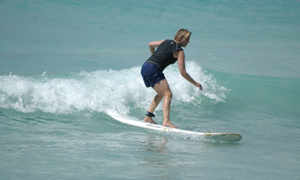Off the coast of New England, a telecommunications company digs trenches for new cable lines. Four years ago, the path of the dig would be a cost-efficient straight line through a vulnerable seafloor ecosystem. Now, thanks to new state policies in Massachusetts, the company is paying more for rerouted cables — but worrying less about lengthy approvals and backlash from environmentalists.
Behind the new policies is Stephanie Moura, executive director of SeaPlan, an ocean management group searching for the balance between pristine waters and thriving economies. Moura’s mission is to bring everyone to the table to build sustainable economies and ecosystems.
In December 2009, her state enacted the Massachusetts Ocean Management Plan, a pioneering policy built on support and research done by SeaPlan. It set the framework for how different groups may use the state’s 1,500 miles of coastline. Combining her skills as a former marine biologist, Greenpeace activist and mediator, Moura is helping Massachusetts update its ocean management plan to set a standard for the rest of the country.
At the February 2013 meeting of the American Association for the Advancement of Science in Boston, SeaPlan’s staff discussed the tradeoffs of erecting giant wind turbines off the New England coast. Over a lingering lunch before the presentation, Moura shared her winding career with SciCom’s Thomas Sumner.
How did you first become interested in doing something with the ocean?
I grew up in a small town in the western Maine mountains, nowhere near the ocean. When I was six, I saw my first Jacques Cousteau special and knew I wanted to do something with the ocean. I originally wanted to be a researcher at sea. I got my scuba certification at age 15, which is hard to do from the lakes of Maine. My mother had to drive me four hours to scuba practice every week. I ended up getting my open-water certification off the coast of Maine in February [1976], and it was brutal. I actually came out of the water throwing up because it was so strenuous and so rough, but I stuck with it.
Did you go into college wanting to do environmental policy?
I started out as a marine biology major at Occidental College [in Los Angeles]. In my sophomore year, two things led me from strict science to more science policy. Much to my dismay, I finally had to admit my sensitivity to motion sickness was too great for me to ever be a good boat person. I won't go into details about that, but boat duty for me is tough. I knew I didn't want to be in a lab the whole time, so I became interested in how we can use science to inform the decisions that determine the fate of our ocean resources. I transferred to UC Santa Cruz, where I took classes on environmental policy and finished my undergraduate degree.
I went to grad school to get a master’s degree in environmental policy at Tufts, here in the Boston area. While I was there I did an internship with none other than Greenpeace.
What did you do at Greenpeace?
I was on my soapbox. I ended up being part of what they call a "direct action." We went out on a Greenpeace vessel to a fishing ground off the Northeast coast here. Our mission was not to disrupt fishing activities, but rather to document them with photography. The drift nets they were using may have been targeting swordfish, but they caught sharks, dolphins and anything else that swam by. We were out at sea for a week. Thankfully, after 24 hours I got my sea legs and I wasn't sick. Two scuba divers would dive down 80 feet and hover near the net. If we saw a dolphin or something get caught in the net we would signal to the folks on top and they would send down the professional camera guy to take pictures. As it turns out, fishing nets billow in the ocean currents just like a curtain in the wind. A few times we were worried we'd get trapped in the net. It was kind of hairy. That was my big mission. We saw a lot of death and destruction and got some great footage of it.
"There's a lot of skepticism about what ocean management is. Some people are saying it's a communist plot to control free and unfettered access to the oceans."
Do you think Greenpeace is beneficial to the cause?
It's not a black-and-white answer. At times, the shrillness of the cry can sometimes polarize an issue and impede progress toward an actual, realistic solution. I think sometimes it can be an impediment. Other times it's necessary to have advocacy groups put a stake in the ground that says, “This is really important.”
What did you do next?
After getting my master’s degree, I got offered a job with Greenpeace in D.C. While I was there I realized that while advocacy is fantastic — you need good well-informed advocates to speak for those who don't have voices — I was interested in this idea of negotiating deals. When I left Greenpeace, I came back up here to Boston and spent six years working with an alternative dispute resolution firm.
After that I stumbled into the precursor to SeaPlan called the Massachusetts Ocean Partnership. This whole idea of ocean planning was just starting to gain momentum. What I'm doing now is arguably the perfect combination of ocean science, marine policy and stakeholder engagement, and consensus building. I couldn't have scripted a better place for me to be. I love it.
Why do we need ocean management plans?
A lot of interest groups, sectors and industries want to use the ocean, but it isn't limitless. There has to be a more scientific way of deciding who gets to use the ocean where, when and how much. We’re working to get the most ecological and economic value out of the ocean at the same time.
How do you balance the economic versus the ecologic?
The balance comes first by understanding that there are tradeoffs. If there's a certain place in the ocean where whale watchers, fishers, recreational boaters, and ferry service all want to operate in the same space, you need to look at how each one impacts the others. Every time there is a decision about which uses are encouraged in an area, somebody wins — and there’s a good chance somebody loses. You try to quantify the tradeoffs and communicate them with the affected stakeholders, and through that process you can make better informed decisions.
Is it hard to get businesses to play along with the environmental side? Or are they mostly game for it?
It depends. For industry folks who require government permits, the last thing they want to do is make enemies in the press and delay their permitting process by having staunch opponents. If there’s an approval at stake, it's easier to get industry to see why it's smart to engage with other stakeholders upfront.
What projects is SeaPlan working on now?
We’re doing a lot of work with Massachusetts as they get ready to update their ocean management plan. We’re also doing a bunch of data gathering. You might imagine we have good information about where recreational boaters go, what they do, how often they go, what routes they take and how much they spend on their trips, but it turns out we really don't know squat. In order to do ocean management planning well, we need good information about who uses the ocean when and where. What's important to them? How do they value it?
Have you ever had to abandon an issue or cause?
Our brand, if you will, is to be a credible broker. We do find ourselves in a position of pushing the envelope. Political administrations have priorities, constituents to keep happy and budgets to maintain. There are times when they know the decision they want to make and just want a way to justify it. We find ourselves in a position of having to push the envelope and say the best practice is to open up the process and make it more transparent. Sometimes we have to back off a little. Otherwise, we lose our ticket to get in the door and affect the process. We have to walk a fine line.
In what ways is ocean management struggling right now?
The really big issue is climate change. In order for ocean planning to realize its full potential, it needs to ask what are things going to look like 20, 50, 100 years from now. Nobody's really doing that yet. There are scenarios we should be thinking about and preparing for.
Do you think ocean management in the United States is moving in the right direction?
Yes, but it has to keep moving. A brick wall is coming up, and it’s inside the [Washington D.C.] Beltway. There's a lot of skepticism bordering on hysteria about what ocean management is. Some people are saying it's a communist plot to control free and unfettered access to the oceans.
Is it?
Not in my mind. To me that's a misunderstanding of ocean planning. It's supposed to be a way to allow industries to make good decisions that lead to sustainable and profitable businesses while at the same time not destroying the underlying ecosystem. Ocean management is moving in the right direction, but we need to find some way to take the brick wall away — or else it could die an untimely death.
You've worked in so many different states on so many different issues. What's guided you from one place and issue to the next?
I don't mean to sound corny, but what's guided me is an inexplicable interest in oceans and an inclination toward problem-solving. Those themes guided me through all the little twists and turns my journey has taken. When I turned 50 a couple of years ago, my response to midlife crisis wasn't getting a convertible or a divorce. Instead, I took up surfing. It’s just another way to be in the ocean. I suck at it still, but I love it.
____________________
Thomas Sumner, a graduate student in the Science Communication Program at UC Santa Cruz, earned his bachelor's degree in physics from UCSC. This year, he has worked as a reporting intern at Inside Science News Service (American Institute of Physics), the Salinas Californian, and Stanford University News Service.
© 2013 Thomas Sumner


